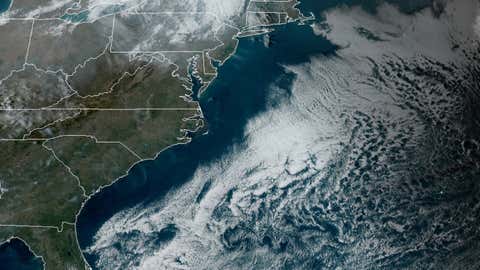After 20 Years, Researcher Now Says the Atlantic Multidecadal Oscillation Doesn't Really Exist | The Weather Channel - Articles from The Weather Channel | weather.com


The term "Atlantic Multidecadal Oscillation" was coined two decades ago to describe cyclical warming and cooling in the North Atlantic Ocean. Now, new research suggests the AMO doesn't really exist.
(NOAA/NESDIS/STAR GOES-East)The researcher who coined the term "Atlantic Multidecadal Oscillation" 20 years ago to describe a natural warming and cooling cycle in the North Atlantic now says the phenomenon doesn't exist.
Scientists have used the AMO for years to explain why there are cycles of increased hurricane activity. The warm phase of the AMO means increased activity. The cool phase means less activity. A complete cycle tends to last 50 to 70 years.
The AMO was first described by Michael E. Mann, a distinguished professor of atmospheric science at Pennsylvania State University and author of "The New Climate War." However, in a paper published last week in the journal Science, Mann and three colleagues blew up years of thinking.
The new research "means that we can more convincingly now conclude that the increases in Atlantic hurricane activity are tied to warming that is human-caused, not natural, in nature," Mann told CBS News.
(MORE: Largest U.S. Gas Spill in 20 Years Happened in North Carolina Last Summer)
Using computer models, the team found no evidence of an internal cause for the oscillation. Instead, volcanic eruptions caused the AMO in the pre-industrial era, the researchers concluded.
Mann and his team have previously shown that in the modern era, human-driven climate change was the biggest cause of the AMO.
Advertisement
"Some hurricane scientists have claimed that the increase in Atlantic hurricanes in recent decades is due to the uptick of an internal AMO cycle," Mann said in a news release. "Our latest study appears to be the final nail in the coffin of that theory. What has in the past been attributed to an internal AMO oscillation is instead the result of external drivers, including human forcing during the industrial era and natural volcanic forcing during the pre-industrial era."
In a blog post on his website, Mann said some scientists misapply the AMO "in a way that downplays some critical climate change impacts like the warming of the North Atlantic and the increase in Atlantic hurricane activity associated with it."
Giving up on two decades of accepted scientific theory won't come easy for many.
Kevin Trenberth, a distinguished scholar at the National Center of Atmospheric Research, told CBS News he thinks computer models may not be able to accurately simulate the AMO and Mann's conclusions may be premature.
The National Oceanic and Atmospheric Administration's Atlantic Oceanographic and Meteorological Laboratory said the role of external factors versus natural variability in the AMO is "a very active area of research."
The AOML said despite the uncertainty, the consensus is that climate change is expected to cause an increase in hurricane intensities and rainfall rates.
In an email to CBS News, Mann wrote, "There is now great URGENCY in acting on the climate crisis, but there is also AGENCY. If we cease adding carbon pollution to the atmosphere, state-of-the-art climate models tell us that the surface warming (which appears tied to more destructive hurricanes) stabilizes within a few years. We can prevent these impacts from getting worse if we act now."
The Weather Company’s primary journalistic mission is to report on breaking weather news, the environment and the importance of science to our lives. This story does not necessarily represent the position of our parent company, IBM.
By accepting you will be accessing a service provided by a third-party external to https://oc3anclub.com/

